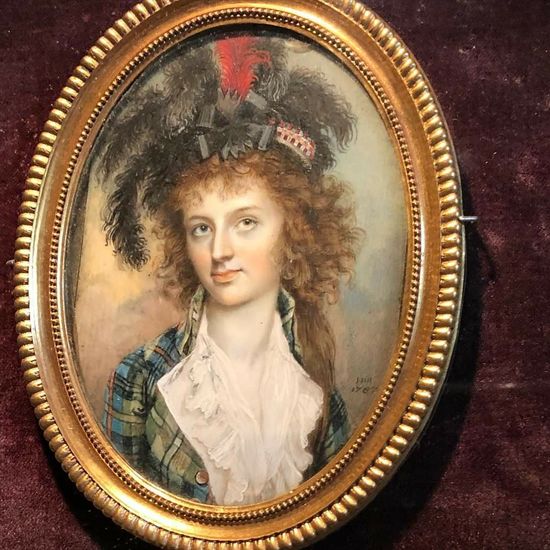Annotation:Mrs. Macleod of Macleod's Strathspey: Difference between revisions
No edit summary |
No edit summary |
||
| Line 3: | Line 3: | ||
<br /> | <br /> | ||
<br /> | <br /> | ||
Norman entertained Samuel Johnson and Boswell at Dunvegan on their tour of Scotland, but was a solider and was | Norman entertained Samuel Johnson and Boswell at Dunvegan on their tour of Scotland, but he was a solider and was stationed overseas for considerable periods. Later in life he also served for a time as an MP where he was one of the early campaigners (1796) to abolish the slave trade. He fought in America during the War for Independence with the 71st Regiment, going there with his first wife, Mary; they were captured by General Washington but kindly treated and eventually paroled to England. He later saw service in India at Madras in 1782 and fought a campaign against Tippoo, taking the fortress of Bednore in 1783. He was promoted to Brigadier General and returned to England in 1789. Two incidents scarred him for life: the death of Mary, and an accusation that he embezzled money while serving in India. He turned to drink, ruining his health, and died at Guernsey where he was preparing to take a voyage. | ||
|f_printed_sources=Robert Mackintosh ('''A Fourth Collection of Strathspey Reels'''), c. 1804; p. 30. | |f_printed_sources=Robert Mackintosh ('''A Fourth Collection of Strathspey Reels'''), c. 1804; p. 30. | ||
}} | }} | ||
Revision as of 15:44, 10 December 2020
X:1 T:Mrs. Macleod of Macleod’s Strathspey C:Robert Mackintosh M:C L:1/16 R:Strathspey B:Robert Mackintosh – “A Fourth Collection of New Strathspey Reels, also some Famous old Reels” (1804, p. 30) N:Dedicated to the Dutchess [sic] of Manchester N:Robert “Red Rob” Mackintosh (c. 1745-1808) was a Scottish violinist and N:composer active in Edinburgh at the end of the 18th century. Originally from N:Tullymet, near Pitlochry, Perthshire. He moved to London in the last decade N:of his life. Z:AK/Fiddler’s Companion K:Gmin d2|gd3Td2c2 B3AGB3|Fc3Af3 ca3A^f3|gd3Td3c B3AGB3|A3e dcBA (BG3G3B)| gd3d3c B3AGB3|Fc3Af3 c2a2A^f3|gd3Td3c TB3AGD3|EC3D3^F G2G,2G,2|| d2|g3d bag^f Bd3Bg3|f3c agf=e Fc3A^f3|g3d (bag^f g)d3ec3|dB3 (dcBA) (B2G2G2d2)| g3d (bag^f) Gd3Bg3|f3c (agf=e) Fc3A^f3|gb3dg3 Bg3ce3|d3B (dcBA) B2G2G2||

Norman entertained Samuel Johnson and Boswell at Dunvegan on their tour of Scotland, but he was a solider and was stationed overseas for considerable periods. Later in life he also served for a time as an MP where he was one of the early campaigners (1796) to abolish the slave trade. He fought in America during the War for Independence with the 71st Regiment, going there with his first wife, Mary; they were captured by General Washington but kindly treated and eventually paroled to England. He later saw service in India at Madras in 1782 and fought a campaign against Tippoo, taking the fortress of Bednore in 1783. He was promoted to Brigadier General and returned to England in 1789. Two incidents scarred him for life: the death of Mary, and an accusation that he embezzled money while serving in India. He turned to drink, ruining his health, and died at Guernsey where he was preparing to take a voyage.

